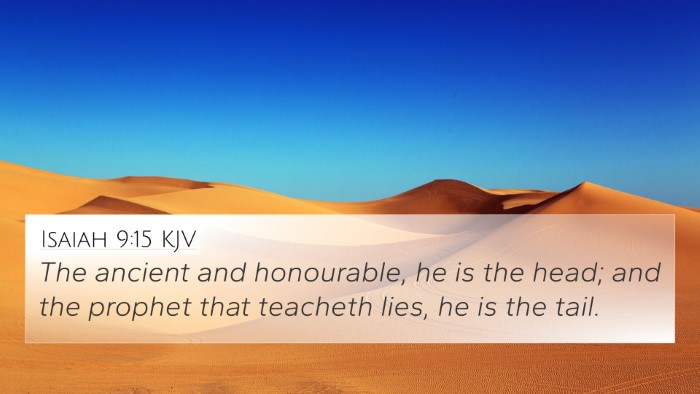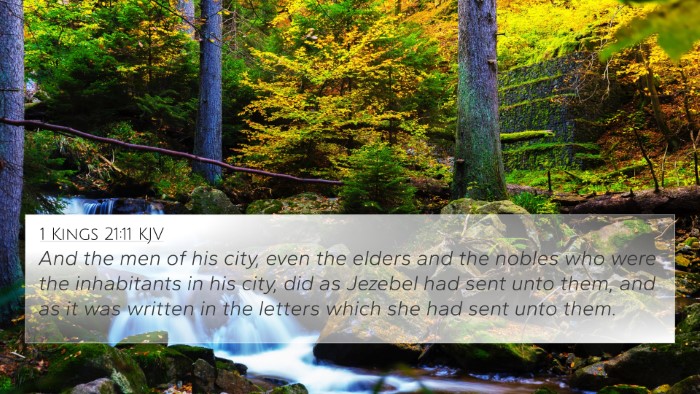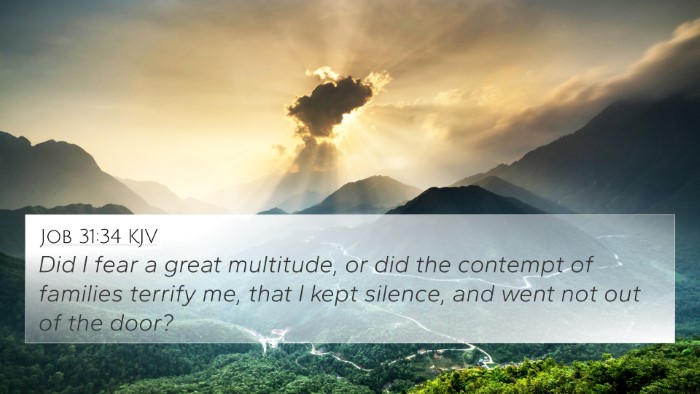Old Testament
Genesis Exodus Leviticus Numbers Deuteronomy Joshua Judges Ruth 1 Samuel 2 Samuel 1 Kings 2 Kings 1 Chronicles 2 Chronicles Ezra Nehemiah Esther Job Psalms Proverbs Ecclesiastes Song of Solomon Isaiah Jeremiah Lamentations Ezekiel Daniel Hosea Joel Amos Obadiah Jonah Micah Nahum Habakkuk Zephaniah Haggai Zechariah MalachiJob 22:8 Similar Verses
Job 22:8 Cross References
But as for the mighty man, he had the earth; and the honourable man dwelt in it.
Uncover the Rich Themes and Topics of This Bible Verse
Listed below are the Bible themes associated with Job 22:8. We invite you to explore each theme to gain deeper insights into the Scriptures.
Job 22:8 Cross Reference Verses
This section features a detailed cross-reference designed to enrich your understanding of the Scriptures. Below, you will find carefully selected verses that echo the themes and teachings related to Job 22:8 KJV. Click on any image to explore detailed analyses of related Bible verses and uncover deeper theological insights.

Isaiah 9:15 (KJV) »
The ancient and honourable, he is the head; and the prophet that teacheth lies, he is the tail.

1 Kings 21:11 (KJV) »
And the men of his city, even the elders and the nobles who were the inhabitants in his city, did as Jezebel had sent unto them, and as it was written in the letters which she had sent unto them.

Job 31:34 (KJV) »
Did I fear a great multitude, or did the contempt of families terrify me, that I kept silence, and went not out of the door?

Job 29:7 (KJV) »
When I went out to the gate through the city, when I prepared my seat in the street!

Isaiah 3:3 (KJV) »
The captain of fifty, and the honourable man, and the counsellor, and the cunning artificer, and the eloquent orator.

Micah 7:3 (KJV) »
That they may do evil with both hands earnestly, the prince asketh, and the judge asketh for a reward; and the great man, he uttereth his mischievous desire: so they wrap it up.
Job 22:8 Verse Analysis and Similar Verses
Understanding Job 22:8
The verse Job 22:8 states: "But as for you, you have set your heart against the Lord and have opposed the Almighty." This passage highlights the stern rebuke from Eliphaz to Job, implying that Job's suffering is a result of his unfaithfulness and opposition to God.
Summary of Job 22:8 Meanings from Public Domain Commentaries
Matthew Henry Commentary
Matthew Henry interprets Job 22:8 as a call to examine Job's heart posture toward God. He emphasizes that Eliphaz is accusing Job of having a rebellious spirit, suggesting that Job's misfortunes stem from a lack of humility before God. According to Henry, the verse serves to remind the reader of the consequences of defiance against God’s will.
Albert Barnes Commentary
Albert Barnes notes that Eliphaz’s argument focuses on the idea of divine retribution. He explains that the verse reflects the belief that God rewards the righteous and punishes the wicked. Barnes suggests that this perspective overlooks the complexity of Job's suffering and assumes a simplistic understanding of God's governance over human affairs.
Adam Clarke Commentary
Adam Clarke discusses the moral implications of Job 22:8, asserting that Eliphaz is wrongfully accusing Job based on a misunderstanding of divine justice. Clarke indicates that the notion of opposition to God does not accurately reflect Job's character, urging readers to consider the nuances of human suffering and God's justice. He sees this verse as a critical moment of misjudgment among the friends of Job.
Related Themes and Connections in the Bible
Job 22:8 provides significant themes that resonate throughout Scripture. Below are key connections and cross-references that enhance understanding and highlight thematic elements aligned with this verse:
- Job 1:22 - "In all this Job did not sin by charging God with wrongdoing." This verse emphasizes Job's integrity despite suffering.
- Proverbs 3:34 - "He mocks proud mockers but shows favor to the humble and oppressed." Here, humility before God is highlighted as a virtue, in contrast to Eliphaz’s accusations.
- Psalm 34:18 - "The Lord is close to the brokenhearted and saves those who are crushed in spirit." This reflects God's care for those who suffer, challenging Eliphaz’s claims.
- Romans 8:28 - "And we know that in all things God works for the good of those who love him." This verse provides a broader perspective on suffering and divine purpose.
- James 4:6 - "But he gives us more grace. That is why Scripture says: 'God opposes the proud but shows favor to the humble.'" This connects to the theme of humility versus pride.
- Ecclesiastes 7:20 - "Indeed, there is no one on earth who is righteous, no one who does what is right and never sins." This verse reinforces the idea that human suffering cannot purely be attributed to personal sin.
- Lamentations 3:33 - "For he does not willingly bring affliction or grief to the children of men." It emphasizes God’s nature in relation to human suffering.
The Importance of Cross-Referencing
The study of Job 22:8 exemplifies the significance of cross-referencing Biblical texts to gain a holistic understanding of scripture. By connecting verses, one can uncover the thematic dialogues between the Old Testament and New Testament, revealing deeper meanings and connections.
Tools and Methods for Cross-Referencing
- Utilize a Bible concordance to find words and themes that resonate with Job 22:8.
- Employ a Bible cross-reference guide to contextualize the verse within a larger narrative framework.
- Engage in cross-reference Bible study to develop insight into related scriptures.
- Practice cross-referencing Bible study methods to systematically explore connections.
- Foster inter-Biblical dialogue by comparing themes across different books of the Bible.
Conclusion
Job 22:8 serves as a poignant reminder of the complexity of suffering, divine justice, and humility before God. By examining this verse alongside others, readers can better appreciate the richness of Biblical themes and the interconnectedness of scripture. Whether during personal study or sermon preparation, understanding the theological implications of this verse and its cross-references is vital to grasping the broader narrative of the Bible.




